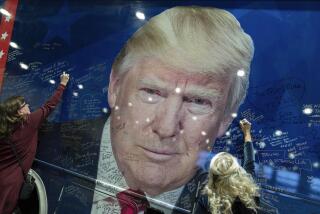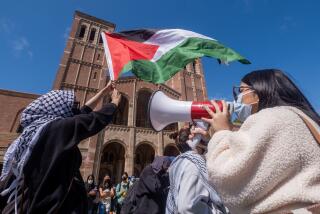CAMPUS CORRESPONDENCE : Decision ‘92: Which Is Best Sorority or Fraternity?
- Share via
HANOVER, N.H. — “American youth,” Marshall McLuhan once said, “attributes much more importance to arriving at driver’s-license age than at voting age.” At Dartmouth, American youth seems to attribute much more relevance to arriving at fraternity-pledging age than at voting age.
Surveys don’t provide much help in piecing together a profile of young voters. Some polls show that young people, largely inspired by Ronald Reagan, continue to register as Republicans. But the American Freshman Survey, released last week by UCLA, disclosed that the proportion of college students who consider themselves liberal to be at its highest level since the late ‘70s.
Yet one characteristic seems clear: the 18- to 25-year-olds aren’t reliable voters. Turnout in 1988 was down nearly 20% from 1972, the first year in which they could vote for President.
Most Dartmouth students are not exceptions to this rule. In our Ivy League fairy-tale land, we are largely immunized to the problems of the outside world by our parents’ regular checks.
Still, there are several political groups on campus. As one might expect, there is a Bush organization. But, according to its coordinator, Dartmouth students for George Bush haven’t done anything yet. The group really can’t be blamed for its inaction, since the Bush campaign in New Hampshire doesn’t seem to have much of a strategy other than to pose the President with cows. It’s too bad for the students, because I’m certain they were counting on cushy jobs after graduation.
Then there’s the Patrick J. Buchanan organization, whose supporters come mostly from the Dartmouth Review. (Buchanan serves on its advisory board.) The national press recently reported that there was a standing-room-only turnout when the columnist came to campus. Well, I was seated, as was most of the audience. Curiosity, not loyalty, was the primary reason for showing.
On the Democratic side, Bill Clinton is the front-runner, with a student organization of 10 to 15 students--despite the goofy bowling picture in Newsweek. He appeals to Dartmouth students because he combines economic conservatism with social liberalism. Yet support doesn’t run too deep: The Dartmouth chair of the Bill Clinton-for-President campaign recently resigned to become a pledge at one of our fraternities.
Paul E. Tsongas has a good following here because he is the favorite-son graduate of Dartmouth. But his student coordinator concedes that the former Massachusetts senator is not electable. What’s important to her is the opportunity to promulgate his ideas.
The student coordinator for Bob Kerrey reports that the senator’s Dartmouth supporters have been canvassing and telephoning potential voters. Sen. Tom Harkin’s says things aren’t looking too good. Indeed, he just quit, but not to join a fraternity. He joked that Harkin has no appeal in New Hampshire. Too bad, Tom. Your populist, FDR-like ideas are too far left for “politically active” Dartmouth students. We greedy capitalists don’t want to share the wealth.
Then there’s your former Gov. Moonbeam, Edmund G. (Jerry) Brown Jr. No student has stepped forward to coordinate his campus efforts. He has frightened all of us away with his 1-800 number pitch during the first debate and his advocacy of the flat tax, at 13%.
Perhaps the fundamental problem is that my generation doesn’t dream. We were weaned on the Reagan Revolution. We believe in the supreme worth of capitalism. We are quick to belittle the common worker. We attend college not to become well-rounded students of the liberal arts but to make money. Our credo is self-advancement. No John F. Kennedy or Franklin D. Roosevelt has jarred us out of our complacency.
In this election, most students will probably vote for Bush because they are comfortable with the status quo, despite growing evidence that the economy is faltering and employment after graduation is no longer a cinch. Until they realize their lifestyle is threatened, Dartmouth students will opt for fraternities or sororities instead of polling booths.
More to Read
Sign up for Essential California
The most important California stories and recommendations in your inbox every morning.
You may occasionally receive promotional content from the Los Angeles Times.













